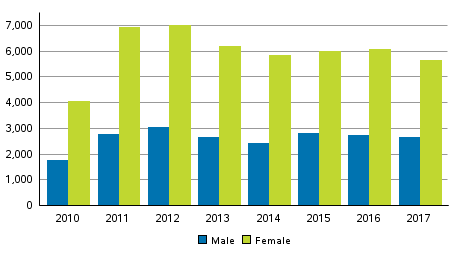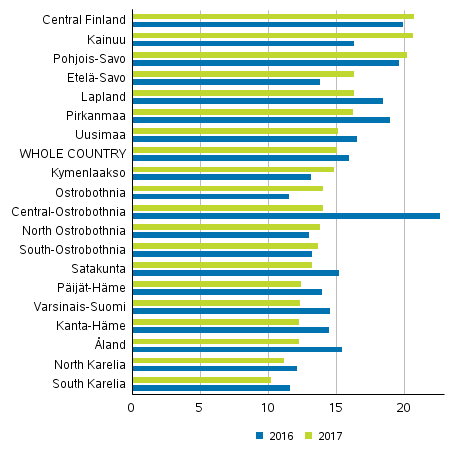Published: 31 May 2018
Share of cases of domestic violence and intimate partner violence between married and cohabiting couples falling
According to Statistics Finland's data, there were 8,300 victims in domestic violence offences recorded by the police in 2017, which is 5.4 per cent down on the previous year. Of victims of domestic violence and intimate partner violence, 68.1 per cent were women. In all, 77.8 per cent of suspects were men. Altogether, 37.1 per cent of domestic violence and intimate partner violence was violence between married or cohabiting couples.
Victims of domestic violence and intimate partner violence by sex in 2010 to 2017

In all, 37.1 per cent of domestic violence and intimate partner violence recorded in 2017 was violence between married or cohabiting couples, which is 3.5 percentage points lower than in 2016. The corresponding share was 46.9 per cent in 2009 and in practice, it has been falling since then. One-fifth of domestic violence and intimate partner violence took place between former married or cohabiting couples. The share has been growing slightly in recent years. In slightly over 80 per cent of cases of violence between married or cohabiting couples and former married or cohabiting couples the victim was a woman. In numbers, violence between married or cohabiting couples and former married or cohabiting couples decreased from the previous year by nearly 500 cases (by 8.8 per cent). In 2017, the number of cases reported was 4,800. In these statistics, persons are considered former cohabiting couples if they have lived together in the year preceding the statistical reference year but not in the statistical reference year.
If we look at only domestic violence and intimate partner violence against adults, 32.6 per cent of cases occurred between married couples, 17.8 per cent between cohabiting couples, 14.1 per cent between former married couples and 14.0 per cent between former cohabiting couples. In all, 78.5 per cent of all domestic violence and intimate partner violence against adults took place between present and former married or cohabiting couples. Among men, the share was 57.1 per cent and among women 85.2 per cent. The number of male victims was 820 and that of female victims 3,900. Compared to the previous year, the number of male victims decreased by 13.3 per cent and that of female victims by 7.6 per cent.
Around one-half of attempted homicides and aggravated assaults were directed towards men. When the victim was a man, one-half of the suspects were men. When a woman was a victim of an aggravated assault or attempted homicide, the suspect was a man in close on 90 per cent of the cases. In 2017, there were 253 aggravated assaults or attempted homicides, of which 135 were directed at men.
Victims of domestic violence and intimate partner violence 2010 to 2017
| Relation between the victim and the suspect/year | 2010 | 2011 | 2012 | 2013 | 2014 | 2015 | 2016 | 2017 |
| Total | 5,768 | 9,660 | 10,053 | 8,802 | 8,245 | 8,794 | 8,757 | 8,281 |
| Suspect is the parent of the victim | 1,393 | 1,876 | 2,311 | 1,862 | 1,799 | 2,315 | 2,274 | 2,212 |
| Siblings | 288 | 574 | 572 | 586 | 486 | 505 | 507 | 498 |
| Directed by a child at his or her parent | 289 | 510 | 505 | 469 | 487 | 470 | 502 | 484 |
| Between spouses, total | 2,469 | 4,444 | 4,424 | 3,805 | 3,572 | 3,581 | 3,554 | 3,069 |
| ...Spouse | 1,548 | 2,780 | 2,765 | 2,387 | 2,196 | 2,105 | 2,219 | 1,983 |
| ...Co-habiting partner | 921 | 1,664 | 1,659 | 1,418 | 1,376 | 1,476 | 1,335 | 1,086 |
| Former spouse | 530 | 970 | 920 | 873 | 830 | 760 | 843 | 859 |
| Former co-habiting partner | 606 | 979 | 1,014 | 948 | 885 | 915 | 840 | 850 |
| Other person living in the same household | 193 | 307 | 307 | 259 | 186 | 248 | 237 | 309 |
Of all recorded domestic violence and intimate partner violence cases, slightly over one-half were assaults and good one-fifth petty assaults. Good 15 per cent of all cases were menaces and around one per cent sexual abuses of a child. One-half of domestic violence and intimate partner violence took place between persons living in the same household.
Domestic violence and intimate partner violence by region per 10,000 population in 2016 and 2017

Underage victims
The legislative amendment, which entered into force at the beginning of 2011, considerably increased the number of recorded assault offences. After the legislative amendment, petty assaults on minors or close relatives became officially prosecutable. In addition, at the beginning of April 2015, an amendment to the Child Welfare Act (1302/2014) came into effect, which extended the reporting obligation in cases where an offence against a child's life or health is suspected. In 2017, cases of violence directed by parents against their underage children decreased by 2.2 per cent compared with the previous year. Acts against boys increased by 5.1 per cent and those against girls declined by 10.0 per cent. The amendments also appear to have increased the proportion of women as suspects of all domestic violence and intimate partner violence. In 2010, the proportion of women suspected of domestic violence and intimate partner violence was 19.6 per cent, and in 2017 the corresponding proportion was 22.2 per cent.
Around one-third of violence directed by parents against their children was carried out by women. The share of violence performed by women was, however, the higher the younger the child victim is. When the victim was under six years old, the suspect was a woman (the child's mother) in 36.6 per cent of cases. When the victim was aged between 15 and 17, the suspect was a woman in 28.8 per cent of cases. The absolute numbers are relatively small, so even the slightest changes can have a big effect on the percentage shares.
Violence directed at underage children by their parents 2017
| Victim's age/person suspected | Male | Female | Person suspected total | ||
| Number | % | Number | % | Number | |
| 0 - 6 | 494 | 63.3 | 286 | 36.6 | 780 |
| 7 - 14 | 660 | 62.7 | 392 | 37.2 | 1,052 |
| 15 - 17 | 163 | 71.1 | 66 | 28.8 | 229 |
| Total | 1,317 | 63.9 | 744 | 36.0 | 2,061 |
As a result of the 2011 amendment, the share of cases where the injured party does not demand punishment or withdraws the claim decreased. Before 2011, in around 12 per cent of reported domestic violence and intimate partner violence, the injured party did not demand punishment. After the amendment, the share has dropped to around four per cent. Similarly, before the amendment, the injured party withdrew the claim in around 11 per cent of cases while after the amendment, the share has dropped to about four per cent.
Recurrence of domestic violence and intimate partner violence
In 2009 to 2017, there were 6,200 victims of domestic and intimate partner violence that, according to the police, have been victims of domestic and intimate partner violence in at least two different years and 1,400 in three different years. Women made up 77 per cent of those having become victims in at least two years and 86 per cent in three years. There were 780 underage persons that had been victims in several years.
A person can also be a victim of domestic violence and intimate partner violence several times in one year. In 2017, there were 8,300 cases of domestic violence and intimate partner violence with 6,500 different victims. Around 1,240 of the victims were persons, who had been the victim of domestic violence and intimate partner violence more than once in 2017.
The age and sex distribution of victims of domestic violence and intimate partner violence differs from the general age and sex distribution of victims of violent offences. In 2017, the victims of domestic violence and intimate partner violence were women in 68.1 per cent of cases, while, in general, the victims of violent offences were women in 45.9 per cent of cases. Only among victims of domestic violence and intimate partner violence aged under 15, the victim was a man more often than a woman. In general, the victims of violent offences are more often men than women. Further information can be found in the appendix table.
Data material
The domestic violence and intimate partner violence data were formed based on register data. Information about domicile, family status and children, parents, spouses and registered partnerships has been combined from Statistics Finland's data for the victim and suspect in the police Patja system of crime reporting data. It has been established whether the victim and suspect are cohabiting based on family status and domicile data. The register data are from the statistical reference year. The data also take into consideration cases where the victim and suspect have been cohabiting in the year preceding the statistical reference year. All offences that were reported in the statistical reference year are included, so the offence can have taken place in an earlier year. In addition to sexual offences in Chapter 20 of the Criminal Code and offences against life and health in Chapter 21, offences related to domestic violence and intimate partner violence include deprivation of personal liberty (Criminal Code, Chapter 25, Sections 1 to 2), menace (Chapter 25, Section 7), stalking (Chapter 25, Section 7a), and coercion (Chapter 25, Section 8). The data include only cases reported to the authorities. The statistics include only cases reported to the authorities, by no means all cases of domestic violence and intimate partner violence are reported to the authorities.
The statistics on Offences known to the police and on Coercive measures were combined in March 2015. Data released prior to that can be found on the old home pages of the statistics. The web pages of the statistics on Offences known to the police: http://www.tilastokeskus.fi/til/polrik/index_en.html and of the statistics on Coercive measures: http://tilastokeskus.fi/til/pkei/index_en.html
Source: Statistics on offences and coercive measures 2017, Statistics Finland
Inquiries: Kimmo Haapakangas 029 551 3252, kimmo.haapakangas@stat.fi
Director in charge: Jari Tarkoma
Publication in pdf-format (237.3 kB)
- Tables
-
Tables in databases
Pick the data you need into tables, view the data as graphs, or download the data for your use.
Appendix tables
Updated 31.5.2018
Official Statistics of Finland (OSF):
Statistics on offences and coercive measures [e-publication].
ISSN=2342-9178. Domestic violence and intimate partner violence 2017. Helsinki: Statistics Finland [referred: 27.2.2026].
Access method: http://stat.fi/til/rpk/2017/15/rpk_2017_15_2018-05-31_tie_001_en.html

